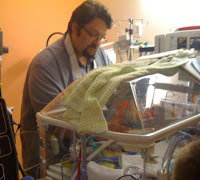In my social media networks, a video is flying around called,
“Big Rich Texas Tip: Stylish Adult Baptism.”
The scorn being heaped on this clip is well deserved. Less than two minutes long, the clip offends
the rational mind from start to finish, with some especially cringe-worthy
moments. My personal favorites include
commentary that one option for baptism could be a church (gasp!) because “sometimes
that’s more traditional,” naming the woman to be baptized “the baptee” (I guess
neosacraments call for neologisms), and a warning against being “boobalicious”
in one’s clothing choices when attending said stylish baptism. I probably don’t need to explain “boobalicious.” What’s not in the clip? Any mention of Jesus Christ, the Holy Spirit,
an ordained minister, or even Christianity itself. The church may not be as stylish as the pool
at your Texas ranch; apparently the “style” thing also excludes the very
unstylish Faith once delivered to the saints.
Leslie, with her “stylish baptism,” is an easy target. Her simplistic and ephemeral take on what the
Church holds as a soul-changing moment is world-class satire without even
trying. Unfortunately, Leslie is only
taking her cues from the Church.
Weddings are the one of the worst areas where we as the
Church have completely caved to the “stylish” culture, inviting all sorts of
symbolism and ritual that have nothing of the depth of the ancient faith. Unity candles, sand pouring, flower petals in
the aisle – we ministers allow these things all the time. Yet these are not Christian symbols, speaking
to vows made before God. If I have to
hear one more preacher proclaim that a wedding is about the bride, or the bride
and groom, I’m going to hurl down from the bell tower my ESV hardback with
Apocrypha. A “church wedding” is where a
man and a woman pledge before God to commit to one another until death – a
wedding is ultimately about a commitment to God. Yes, let’s make it beautiful; yes, let’s make
it enjoyable. But let’s make it about God, from start to finish, a model for the married
life to come.
Funerals are a close second.
Rambling eulogies and “personal touches” of the deceased move our minds
and hearts away from the purpose of a funeral: to commit our loved one to God. Yes, let’s take time to remember them fondly;
yes, let’s make it personal. I do most
funerals in segments. I lead the funeral
service itself, and only after I have completed the liturgy and could actually
go home do I turn it over to the family for eulogies and the like. A funeral, like a wedding, is not ultimately
about us, about the one whose obituary is handed out. A funeral is about God, about reflecting on
the victory over death won by Jesus in the Cross and Resurrection, and a sober
opportunity for all involved to consider our own mortality.
So let’s have our fun with Leslie and her stylish baptism,
but the Church and our own diminishing of the sacraments are the reasons such a
video clip exists. May God, and God
alone, be glorified in our weddings, our funerals, and even our stylish
baptisms!


